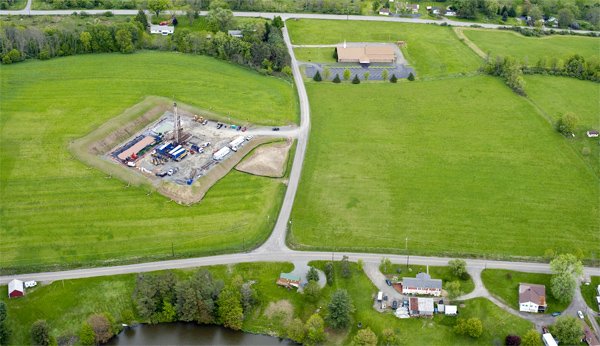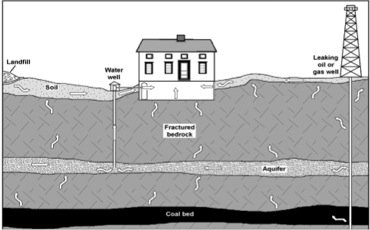Human Health Risks

Natural Gas Well Site, Near Church and Homes, Dimock, PA. Photo © 2010 J. Henry Fair
With oil and gas companies moving in on watersheds for some of the largest metropolitan areas in the United States, concern is growing about the potential impacts of hydraulic fracturing locally and downstream of drilling areas.
Hydraulic fracturing involves drilling through the water table into deep underground shale gas reserves. Millions of gallons of water are then used to break the shale and release the gas. In theory, all wells should be completely incased until past the water table level. However, there have been numerous instances of cases breaking or being improperly formed and hazardous water being released into the groundwater. This contaminated groundwater then allows for gas to enter homes and soil, creating potentially dangerous situations, including exploding homes.
 The enormous amount of water used for each well during hydraulic fracturing also creates millions of gallons of wastewater containing thousands of pounds of chemicals. According to the Pennsylvania Department of Environmental Protection, there can be up to 435 products containing 344 different chemicals used for one drilling. While the actual formulas used by each company are proprietary, the individual ingredients are public record. Of the 344 chemicals, many of which have little to no safety information associated with them, over 75% are known to cause skin, eye, and sensory organ irritation. 20 to 30% cause reproductive, mutagenic, or cancerous complications.
The enormous amount of water used for each well during hydraulic fracturing also creates millions of gallons of wastewater containing thousands of pounds of chemicals. According to the Pennsylvania Department of Environmental Protection, there can be up to 435 products containing 344 different chemicals used for one drilling. While the actual formulas used by each company are proprietary, the individual ingredients are public record. Of the 344 chemicals, many of which have little to no safety information associated with them, over 75% are known to cause skin, eye, and sensory organ irritation. 20 to 30% cause reproductive, mutagenic, or cancerous complications.
These chemicals are commonly transmitted through the air and water. Benzene, a known carcinogen, is commonly found at levels far exceeding federal standards in the air around fracking sites. Groundwater can also become highly contaminated through spills of hydraulic flowback that is improperly stored in open air pits or injected back into the ground. The toxins and chemicals found in contaminated groundwater can cause numerous health hazards for anyone exposed through drinking, bathing, or other forms of contact with this water.
Some companies have even been accused of spraying flowback onto roads to limit dust, as well as to dispose of the unwanted wastewater. This action again exposes humans, as well as many animals, through particles being kicked into the air by cars or via water runoff after rain.
One of the main opponents to hydraulic fracking is Dr. Theo Colborn, who founded the group The Endocrine Disruption Exchange. This website provides in-depth lists of commonly used chemicals in the drilling and fracking process, as well as more information on some of the potential human health risks.
There is an ongoing study by the Environmental Protection Agency (EPA) to examine the potential effects on humans of hydraulic fracturing. As of right now, that study has not been completed, however, fracking is still being allowed to continue without the risks being fully known. In addition, wells are generally poorly regulated and inspected, since there are often far too few inspectors compared to the enormous numbers of wells.
Currently many gas companies dispose of their wastewater through public wastewater treatment plants. However, these plants are not set up to remove the vast amounts of chemicals, sediments, and toxins in this flowback. Therefore, millions of gallons of chemicals may be released into rivers and streams that are then used as primary drinking water sources downstream. If left unchecked, this pollution could permanently damage key freshwater reservoirs needed to deliver water to millions of Americans.
People all over the country are starting to take notice. Former congressman and current gubernatorial candidate Joe Hoeffel has called for a moratorium on all new drilling permits because of concerns over groundwater contamination, he said in an interview with DCBureau. In another interview with the Huffington Post he said, "Coal mining was not well regulated in Pennsylvania and it is the same with natural gas." He also went on to call for a "moratorium on the leasing of state land until an inventory is taken." In addition, New York Governor David Patterson issued an environmental impact statement be done after growing concern in the state, which resulted in a moratorium of all permits in NY.
For more information, watch the film Split Estate by Bullfrog Films.


